February's Written Primary Source for the History Classroom
Activities for the History Classroom
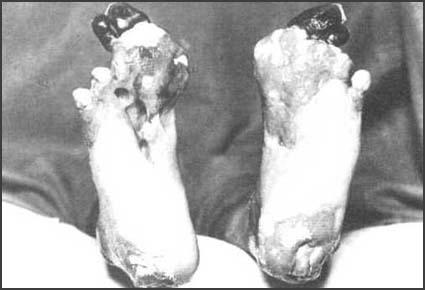
23rd February, 2022: After the First World War, Sergeant Harry Roberts of the Lancashire Fusiliers was interviewed about his experiences of trench warfare.
If you have never had trench feet described to you. I will tell you. Your feet swell to two or three times their normal size and go completely dead. You could stick a bayonet into them and not feel a thing. If you are fortunate enough not to lose your feet and the swelling begins to go down. It is then that the intolerable, indescribable agony begins. I have heard men cry and even scream with the pain and many had to have their feet and legs amputated.
Question: Many soldiers fighting in the First World War suffered from trench foot. This was an infection of the feet caused by cold, wet and insanitary conditions. In the trenches men stood for hours on end in waterlogged trenches without being able to remove wet socks or boots. The feet would gradually go numb and the skin would turn red or blue. If untreated, trench foot could turn gangrenous and result in amputation. Trench foot was a particular problem in the early stages of the war. How did the British Army solve this problem?
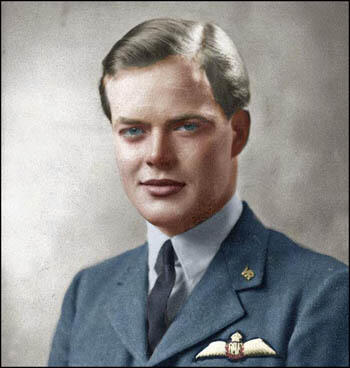
23rd February, 2022: Richard Hillary, The Last Enemy (1942)
We ran them at 18,000 feet, twenty yellow-nosed Messerschmitt 109s, about five hundred feet above us. Our Squadron strength was eight, and as they came down on us we went into line astern and turned head on to them. Brian Carberry, who was leading the Section, dropped the nose of his machine, and I could almost feel the leading Nazi pilot push forward on his stick to bring his guns to bear. At the same moment Brian hauled hard back on his control stick and led us over them in a steep climbing turn to the left. In two vital seconds they lost their advantage.
I saw Brian let go a burst of fire at the leading plane, saw the pilot put his machine into a half roll, and knew that he was mine. Automatically, I kicked the rudder to the left to get him at right angles, turned the gun button to 'Fire', and let go in a four-second burst with full deflection. He came right through my sights and I saw the tracer from all eight guns thud home. For a second he seemed to hang motionless; then a jet of red flame shot upward and he spun to the ground.
For the next few minutes I was too busy looking after myself to think of anything, but when, after a short while. they turned and made off over the Channel, and we were ordered to our base, my mind began to work again. It had happened.
My first emotion was one of satisfaction, satisfaction at a job adequately done, at the final logical conclusion of months of specialised training. And then I had a feeling of the essential rightness of it all. He was dead and I was alive; it could so easily have been the other way round; and that would somehow have been right too. I realised in that moment just how lucky a fighter pilot is. He has none of the personalised emotions of the soldier, handed a rifle and bayonet and told to charge. He does not even have to share the dangerous emotions of the bomber pilot who night after night must experience that childhood longing for smashing things. The fighter pilot's emotions are those of the duellist-cool, precise, impersonal. He is privileged to kill well. For if one must either kill or be killed, as now one must, it should, I feel, be done with dignity. Death should be given the setting it deserves; it should never be a pettiness; and for the fighter pilot it never can be....
I was peering anxiously ahead, for the controller had given us warning of at least fifty enemy fighters approaching very high. When we did first sight them, nobody shouted, as I think we all saw them at the same moment. They must have been 500 to 1000 feet above us and coming straight on like a swarm of locusts. The next moment we were in among them and it was each man for himself. As soon as they saw us they spread out and dived, and the next ten minutes was a blur of twisting machines and tracer bullets. One Messerschmitt went down in a sheet of flame on my right, and a Spitfire hurtled past in a half-roll; I was leaving and turning in a desperate attempt to gain height, with the machine practically hanging on the airscrew.
Then, just below me and to my left, I saw what I had been praying for - a Messerschmitt climbing and away from the sun. I closed in to 200 yards, and from slightly to one side gave him a two-second burst: fabric ripped off the wing and black smoke poured from the engine, but he did not go down. Like a fool, I did not break away, but put in another three-second burst. Red flames shot upwards and he spiralled out of sight. At that moment, I felt a terrific explosion which knocked the control stick from my hand, and the whole machine quivered like a stricken animal. In a second, the cockpit was a mass of flames: instinctively, I reached up to open the hood. It would not move. I tore off my straps and managed to force it back; but this took time, and when I dropped back into the seat and reached for the stick in an effort to turn the plane on its back, the heat was so intense that I could feel myself going. I remember a second of sharp agony, remember thinking "So this is it!" and putting both hands to my eyes. Then I passed out.
Question: When he shot down his first German aircraft Richard Hillary commented "I realised in that moment just how lucky a fighter pilot is." What did he mean by this?
Richard Hillary managed to bale out of his burning Supermarine Spitfire and landed in the Channel. Rescued by the Margate Lifeboat, the badly burnt Hillary was sent to the Queen Victoria Burns Unit in East Grinstead, where he was treated by the plastic surgeon, Archibald McIndoe.
After leaving hospital he went to the United States where he gave lectures for the Ministry of Information on the Second World War. While on the tour he wrote his book, The Last Enemy, that dealt with his experiences during the Battle of Britain.
Richard Hillary returned to the Royal Air Force and was killed along with his navigator when he crashed his Blenhiem on 8th January, 1943.
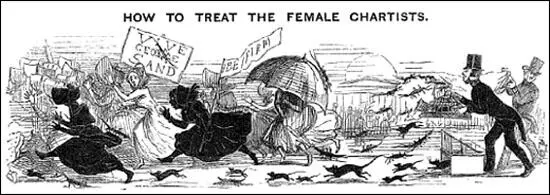
22nd February, 2022: Punch Magazine (15th July 1848)
London is threatened with an irruption of female Chartists, and every male of experience is naturally alarmed.... We confess we are much more alarmed about the threatened rising of the ladies than we should be by the revolt of half the scamps in the metropolis. The women must be put down, as any unfortunate victim of female domination can testify.
How then, are we to deal with the female Chartists? The police will never be got to act against them; for that gallant force knows how much the kitchens are in the hands of the gentler sex, and there is no member of the force who would willingly make himself an outcast from the hearth of the British basement. We have however, something to propose that will easily meet the emergency. A heroise who would never run from a man, would fly in dismay before an industrious flea or a burly black-beatle. We have only to collect together a good supply of cockroaches, with a fair sprinkling of rats, and a muster of mice, in order to disperse the largest and most ferocious crowd of females that ever was collected. We respectfully submit our proposition to Sir George Grey, as a certain specific for allaying female turbulence.
Question: Chartist Female Associations campaigned for women's suffrage. Describe the ways that Punch Magazine opposed the idea.
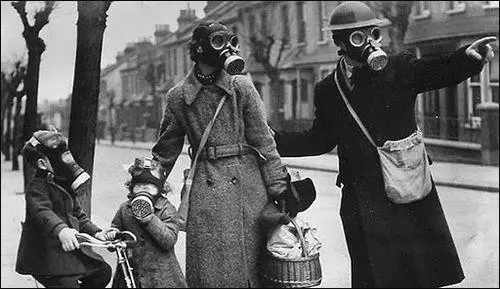
16th February, 2022: Joyce Storey wrote about the issuing of gas masks in her autobiography Joyce's War (1992)
Elsie remarked that she had spoken to Mr. Fry, the local Councillor and her next-door neighbour, and he had told her in confidence that the first consignment of gas masks due to be delivered the following week would be far from adequate and it was a question of distribution. Whoever got there first would be lucky.
Elsie was right about the gas masks, and several weeks later there was a mad panic for these frightful looking things at local school rooms, where they were being distributed. People reacted in the most uncivilised way because they were so certain that poison gas would be used by the Germans and there were not enough gas masks issued on that first delivery. We carried them everywhere with us. In fact, it became a kind of ritual to say each time we ventured forth, 'Don't forget, Gas Mask, Identity Card and Torch.'
The Identity Cards had to be carried in wallets and handbags at all times. My identity number was TKBR/82/10. There was a brisk trade done with identity bracelets and necklaces. We bought special ones for loved ones and friends. Shelters were erected in back gardens. Ours took up all the small dirt square, with the opening coming right up to the edge of the path. Each street had an Air Raid Warden. My father was the warden for our street. He had no flowers to look at now, but spent hours looking up into the sky.
Question: Why did the government decide to issue gas masks to everyone living in Britain in 1939? How does this explain why "people reacted in the most uncivilised way"?
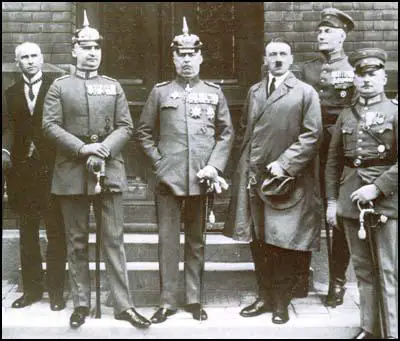
Wilhelm Brückner and Ernst Röhm in 1923
15th February, 2022: Adolf Hitler, speech made at the Burgerbraukeller (8th November, 1923)
The Bavarian Ministry is removed. I propose that a Bavarian government shall be formed consisting of a Regent and a Prime Minister invested with dictatorial powers. I propose Herr von Kahr as Regent and Herr Pohner as Prime Minister. The government of the November Criminals and the Reich President are declared to be removed. I propose that, until accounts have been finally settled with the November criminals, the direction of policy in the national Government be taken over by me. Ludendorff will take over the leadership of the German National Army, Lossow will be German Reichswehr Minister, Seisser Reich Police Minister.... I want now to fulfil the vow which I made to myself five years ago when I was a blind cripple in the military hospital: to know neither rest nor peace until the November criminals had been overthrown, until on the ruins of the wretched Germany of today there should have arisen once more a Germany of power and greatness, of freedom and splendour.
Question: After the failure of the Beer Hall Putsch the leaders, including Adolf Hitler, Ernst Röhm, Eric Ludendorff, Wilhelm Frick, Wilhelm Brückner, Hermann Kriebel, Walter Hewell, Friedrich Weber and Ernst Pöhner were charged with high treason. What did Hitler mean by the term "November criminals"?
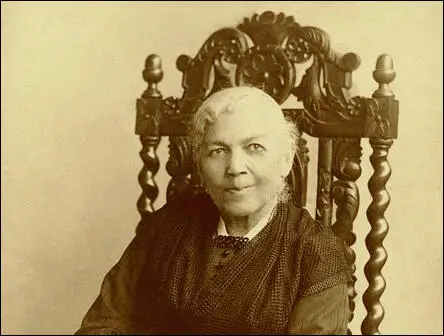
14th February, 2022: Harriet Jacobs, Incidents in the Life of a Slave Girl (1861)
I was born a slave; but I never knew it till six years of happy childhood had passed away. My father was a carpenter, and considered so intelligent and skillful in his trade, that, when buildings out of the common line were to be erected, he was sent for from long distances, to be head workman. On condition of paying his mistress two hundred dollars a year, and supporting himself, he was allowed to work at his trade, and manage his own affairs. His strongest wish was to purchase his children; but, though he several times offered his hard earnings for that purpose, he never succeeded. In complexion my parents were a light shade of brownish yellow, and were termed mulattoes. They lived together in a comfortable home; and, though we were all slaves, I was so fondly shielded that I never dreamed I was a piece of merchandise, trusted to them for safe keeping, and liable to be demanded of them at any moment.
Mrs. Norcom, like many southern women, was totally deficient in energy. She had not strength to superintend her household affairs; but her nerves were so strong, that she could sit in her easy chair and see a woman whipped, till the blood trickled from every stroke of the lash. She was a member of the church; but partaking of the Lord's supper did not seem to put her in a Christian frame of mind. If dinner was not served at the exact time on that particular Sunday, she would station herself in the kitchen, and wait till it was dished, and then spit in all the kettles and pans that had been used for cooking. She did this to prevent the cook and her children from eking out their meager fare with the remains of the gravy and other scrapings. The slaves could get nothing to eat except what she chose to give them. Provisions were weighed out by the pound and ounce, three times a day. I can assure you she gave them no chance to eat wheat bread from her flour barrel. She knew how many biscuits a quart of flour would make, and exactly what size they ought to be.
Dr. Norcom was an epicure. The cook never sent a dinner to his table without fear and trembling; for if there happened to be a dish not to his liking, he would either order her to be whipped, or compel her to eat every mouthful of it in his presence. The poor, hungry creature might not have objected to eating it; but she did object to having her master cram it down her throat till she choked.
On one of these sale days, I saw a mother lead seven children to the auction-block. She knew that some of them would be taken from her; but they took all. The children were sold to a slave-trader, and their mother was bought by a man in her own town. Before night her children were all far away. She begged the trader to tell her where he intended to take them; this he refused to do. How could he, when he knew he would sell them, one by one, wherever he could command the highest price? I met that mother in the street, and her wild, haggard face lives to-day in my mind. She wrung her hands in anguish, and exclaimed, "Gone! All gone! Why don't God kill me?" I had no words wherewith to comfort her. Instances of this kind are of daily, yea, of hourly occurrence.
Question: Use the example of Harriet Jacobs' account to explain the problems of being a slave in the United States.
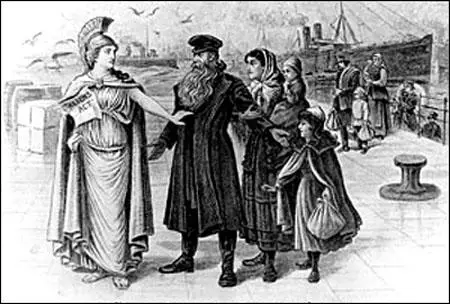
11th February, 2022: Joseph Finn, Voice from the Aliens (1895)
It is, and always has been, the policy of the ruling class to attribute the sufferings and miseries of the masses (which are natural consequences of class rule and class exploitation) to all sorts of causes except the real ones. The cry against the foreigner is not merely peculiar to England, it is international. Everywhere he is the scapegoat for other's sins. Every class finds in him an enemy. So long as the Anti-Alien settlement in this country was confined to politicians, wire-pullers, and to individual working-men, we, the organised aliens, took no heed; but when this ill-founded sentiment has been officially expressed by the organised working men of England, then we believe that it is time to lift our voices and argue the matter out....
The average annual immigration of Aliens in England according to the report of the Board of Trade for 1891-1893 has been 24,688, whilst the average annual emigration is put down by the Dictionary of Statistics at 164,000. In face of these figures, we repeat our argument. If immigration over-guts the market then emigration must logically relieve it. And, seeing that emigration is more than six times the immigration, we cannot see why England should cry out so loudly about the foreigner...
We, the Jewish workers, have been spoken of as a blighting blister upon the English trades and workers, as men to whose hearts it is impossible to appeal, and were it not for us, the conditions of the native worker would be much improved. He would have plenty of work, good wages and what not.
Well, let us look at the facts, let us examine the condition of such workers with whom the Jew never comes in contact, such as the agricultural labourer, the docker, the miner, the weaver, the chainmaker, shipbuilder, bricklayer and many others. Examine their condition, dear reader, and answer: is there any truth in the remark that we are a “blighting blister” upon the English worker?
Question: In the 1890s the government came under pressure from right-wing elements in the Conservative Party, and reactionary newspapers such as the Daily Mail, to do something about immigration controls. In 1900 the British Brothers' League was formed with the intention of persuading the government to deport recently arrived Jewish immigrants (on average about 500 Jewish refugees were granted political asylum every year). Eventually, Arthur Balfour, the prime minister, agreed to introduce an Aliens Act. As David Rosenberg has pointed out: "The Alien's Act drastically reduced the numbers of Jews seeking economic betterment in Britain who were permitted to enter; it also prevented greater numbers of asylum-seekers, escaping harrowing persecution, from finding refuge. In 1906, more than 500 Jewish refugees were granted political asylum. In 1908 the figure had fallen to twenty and by 1910, just five. During the same period, 1,378 Jews, who had been permitted to enter as immigrants but were found to be living on the streets without any visible means of support, had been rounded up and deported back to their country of origin."
Explain the arguments put forward by Joseph Finn in his article Voice from the Aliens (1895).
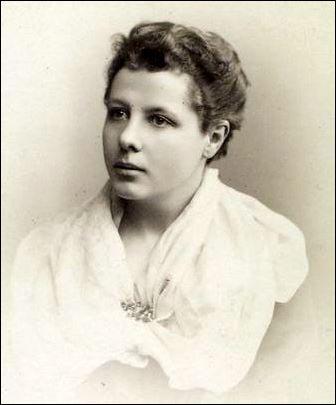
9th February, 2022: Annie Besant, statement in court (19th June, 1877)
If you go to Islington you find a million of children, all under five years of age, and among them the death rate is 66.9 in a thousand, although Islington is one of the healthiest districts in the metropolis. The death rate, however, is nearly double that in the eastern districts. If you go to Whitechapel, for instance, there the death rate is as much as 102 in a thousand; they die before reaching the age of five years. In Manchester, again, the death-rate is 117 in a thousand; in Liverpool it is 132 in a thousand; and all that death rate I put down as death resulting from what I call preventable diseases, and I urge that you can only judge upon this case when you put before yourselves clearly whether it is either moral or right to allow children to be brought into the world, inoculated with the predisposition to be attacked by these preventable diseases, instead of putting, as I believe you ought to do, a check which would effectively relieve the population so terribly overcrowded; and you have to consider whether by refusing to apply such a check, we are not, by the very refusal, making a large class of criminals....
Professor Fawcett states that among "children belonging to the upper and middle classes 20 per cent die before they reach the age of five"; and he adds that the amount is more than doubled in the case of children belonging to the labouring classes. This great mortality amongst poor children is caused by neglect, by want of proper food, and by unwholesome dwellings. When we take these facts, and find that this large number of children have literally been murdered, when you consider that the number of these children who, if they had been born in a higher rank, would not have died, is calculated by Professor Fawcett as 1,150,000... you will see what a large and important question this is....
I say that men and women will marry young - in the flower of their age - and more especially will this be the case amongst the poorer classes... I cannot go to the poor man, and tell him that the brightest part of his life is to be spent alone, and that he is to be shut out for years from the comforts of a home and the happiness of married life ... Gentlemen, do not be deceived. There is no talk in this book of preventing men and women from becoming parents; all that is sought here is to limit the number of their family. And we do not aim at that because we do not love children, but, on the contrary, because we do love them, and because we wish to prevent them from coming into the world in greater numbers than there is the means of properly providing for. Children, I believe, have an influence upon parents purifying in the highest degree, because they teach the parents self-restraint, self-denial, thoughtfulness, and tenderness to an extent that cannot possibly be overestimated; and it is because I wish to have it made possible for young men and for young women to have these influences brought to bear upon them in their youth, that I advocate the circulation of a book that will put within their reach the knowledge of how to limit the extent of their families within their capabilities of providing for them; for no man can look with pride and happiness upon his home if he has more children than he can clothe and educate...
We can only suppose, for a moment, that he was utterly ignorant that the Government had done the very thing which he characterised as obscene, for I am sure all ties of party, if nothing else, would prevent a gentleman in open court from characterising the action of his colleagues in office as actions which were thoroughly obscene, and ought to be indicted at common law. I will claim that if you bring in a verdict against us it will only be fair that you should also sit in judgment upon my Lord Beaconsfield, my Lord Salisbury, and my Lord Derby, and that they should hold the same position we hold in court today, to answer for circulating books which are distinctly obscene, which we find them putting into the hands of young girls.... I hold so thoroughly that the Government is right in putting that information...in the hands of boys and girls (and I am speaking to you here as the mother of a daughter for whose education you must at least suppose I have some care and some interest), that I say to you deliberately, as mother of a daughter whom I love, that I believe it will tend to her happiness in her future, as well as to her health, that she shall not have made to her that kind of mystery about sexual functions that every man and woman must know sooner or later...
When I was first married my own doctor gave me the work of Chavasse, on the ground that it was better for a woman to read the medical details than it was for her to have to apply to one of the opposite sex to settle matters which did not need to be dealt with by the doctor; practically these pages in Knowlton's work are a very short and very careful summary of the subject dealt with by Chavasse and Bull : where you have got to deal with a sixpenny book you must summarise the details...
Question: Explain the arguments being put forward by Annie Besant. Why was she doing this in court?
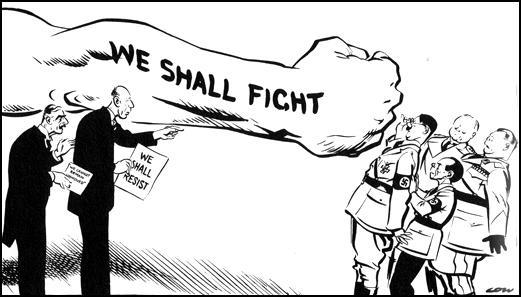
8th February, 2022: Clement Attlee on Neville Chamberlain signing the Munich Agreement, that appeared in his autobiography of As It Happened (1954)
When, with Austria in his possession. Hitler opened his campaign against Czechoslovakia in the late spring of 1938 I was much concerned. I had many friends among the Czech socialists and I also knew Dr. Benes and Jan Masaryk very well. Czechoslovakia was the only real democracy among the Succession States.
I did not believe that Hitler could be argued out of his plan to absorb this key strategic State in the German Reich. We in our Party were violently opposed to Fascism. We had seen with horror the persecution of the Jews and the socialists in Germany.
Chamberlain informed me of his intention to fly to Germany to see Hitler, which he thought was a possible way of averting war. I told him that I had little faith in the venture, but I could not oppose his action provided that he stood firm on principle. He informed the House of his intention just when we were about to debate Foreign Affairs. I said that no chance should be neglected of preserving peace without sacrifice of principle. But it was just this sacrifice which was made. On his return from Munich with a piece of paper we realised that the pass had been sold and we sat silent while the majority of the Tories stood up and cheered.
It was on the 3rd October, 1938, that Chamberlain reported to the House of Commons on his visit to Munich. I recall that before the Prime Minister made his statement. Duff Cooper (later Lord Norwich) made a personal explanation of the reasons that had led him to resign from the Government the previous day. Following immediately after Chamberlain, I spoke at some length and perhaps the line I took can be summed up in a couple of sentences early in my speech: "The events of these last few days constitute one of the greatest defeats that this country and France have ever sustained. There can be no doubt that it is a tremendous victory for Herr Hitler."
Question: Read about the Munich Agreement and then explain Clement Attlee's comments: "The events of these last few days constitute one of the greatest defeats that this country and France have ever sustained. There can be no doubt that it is a tremendous victory for Herr Hitler."
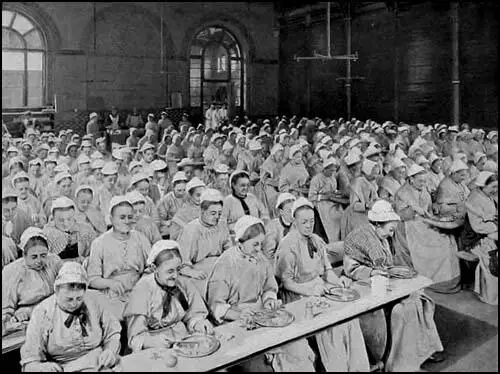
2nd February, 2022: Mary Higgs, Glimpses Into the Abyss (1907)
Having gradually been brought to the conviction, by investigation of numerous cases of destitution among women, that there were circumstances in our social arrangements which fostered immorality, I resolved to make a first-hand exploration, by that method of personal experiment, which is the nearest road to accurate knowledge, of the conditions under which destitute women were placed who sought the shelter of the common lodging-house or the workhouse.
It was necessary to find a friend willing to share the possible perils of such an experiment, and to arrange in such a way that it should be unknown to all but a few. I was fortunate in finding a fellow-worker willing to go with me, and as to the truth of the following story she is a sufficient witness.
We dressed very shabbily, but were respectable and clean. We wore shawls and carried hats, which we used if desirable, according to whether we had sunshine or rain, or wished to look more or less respectable. We carried soap, a towel, a change of stockings, and a few other small articles, wrapped in an old shawl. My boots were in holes, and my companion wore a grey tweed well-worn skirt. My hat was a certificate for any tramp ward, and my shawl ragged, though clean. We had one umbrella between us.
Our plan of campaign was to take train to a town some way from home, arriving in the evening, and then to seek lodging. We had five nights to spend, and were expected at a town some way off by friends who thought we were on a "walking tour"! We cut ourselves off from civilisation on Monday with 2s. 6d. in our pockets and a considerable distance between us and home. We were expected on Saturday by our friends. We thought that we should be able to sample only two workhouses after the first night, expecting to be detained two nights at each.
Escaping observation by going to a country railway station, we took train to a town about fifteen miles from home. We enquired of the police and others, and found that there was a large municipal lodging-house, so we bought a loaf and a quarter of a pound of butter, and applied for beds. We were just in time to get a double bed in the married couples' quarters, for which we paid sixpence. We were shown by a servant - a young woman, about twenty-three apparently into a large, lofty kitchen, furnished with wooden tables and benches. There was a splendid kitchen range, and all was clean and tidy; hot and cold water were laid on to a sink, and boiling water for making tea could be drawn from a tap. Pots and pans, and basins to drink out of, were kept in a handy cupboard. One roller towel, however, was all the convenience for personal washing or for wiping pots. There was a dish-cloth, and we preferred to wash our pots and put them away to dry rather than to wipe them on the towel used by our fellow-lodgers.
Our first difficulty was as follows: We had bread and butter; we had, also, in our bundle, some tea and sugar, the latter mixed with plasmon, as we feared we might not keep our strength up till the weekend without some such help. But we had neither spoon, knife, nor fork, so we could not spread our butter nor stir our tea. A woman, with a girl of twelve, whose language left much to be desired, told us we could have the three necessary articles, and also a locker in which to keep our food, by depositing one shilling. We accordingly did this, but were not given a locker, as we were only staying one night. We had to put our provisions in the corner of a cupboard used by others, but they were not touched. Provided with the necessary implements, we proceeded to make tea, and to cut our bread and butter receiving friendly hints from people who saw we were novices, and studying our companions. We drank out of basins. Besides the loud-voiced woman and child of twelve, there was a man and his wife, and a very nagging woman, whose husband received a great deal of abuse. The inmates appeared to know each other somewhat, and talked about others who had lived there.
We made enquiries for the closet, and found that the key hung by the fireside, and gave admission to a single water-closet, very small, in a yard through which everyone passed to the kitchen. This appeared to do duty for the single women also, as they used the same kitchen and sitting-room as the married couples. There was a good flush of water caused by a movable seat. There was no lavatory or any convenience for washing except the sink in the kitchen used by all the lodgers, men and women alike, but there was a notice up that "slipper baths" could be had for twopence. This absence of any opportunity for personal cleanliness, apart from extra payment, must lead to uncleanliness of person where people are all living on the edge of poverty; it is, too, most desirable that women should be able to wash apart from men.
After tea we found our way upstairs to a sitting-room, also furnished with wooden tables and benches and fairly clean. Beyond it was a bedroom for single females, separated by wooden partitions into cubicles. The servant was in attendance, and was the only official we saw during our stay, except when we purchased our bed at the office, and obtained and returned our knife, fork and spoon. Being very tired, we asked for our bed, and were shown a boarded-off cubicle, the door of which we could bolt. It was lighted by a large window, and in the dim light looked fairly clean, but the floor was dirty. The top sheet of the bed was clean, the bottom one dirty, and the pillows filthy. We spread a clean dress skirt over them and resigned ourselves. The bed was flock, and was hot and uncomfortable; it smelt stale. We opened the window. There was no furniture besides the bed; we hung our clothes on nails in the partition. I killed a bug on the wall close to my head....
A considerable flurry was caused by the advent in the corner of two or three huge black beetles, or "blackjacks" as they were called, which made everybody draw up their skirts. The form was removed to the middle of the room. The dark young lady told us a good deal about her past; how she had an old mistress who died in her chair and "looked heavenly," and how her daughter wished to take her to London, and even sent her fare, but she would not go. She sighed over it, and said, when we asked her if she was not sorry, that she had wished many times she had gone; "but," she added, "I was young and foolish, and had no one to advise me." A nice, bright-looking young girl, who had come in looking very weary, and who had a bad cough, interested us much. She had been out since eight, but obtained no money. She said she had been out all one night, and so got her cough. Later we learned her story. She had been out late one night when in service on a gala day, and, having a strict mistress, she was afraid of returning to her place. A companion persuaded her to take train to N...... The girls had just enough money, and were landed as strangers in a strange town. They walked about and found this lodging-house. They entered, and, being destitute, fell at once into prostitution.
Question: Mary Higgs, the wife of a Congregational minister, became concerned about the scale of poverty she saw and carried out a study of the lives of homeless people in Oldham. Encouraged by the work of James Greenwood, who was the first journalist to use the pioneering technique of temporarily adopting the dress and circumstances of others, she decided to carry out a detailed study of poverty in the town. Later, using the same approach, she visited towns all over England. This gave her the material for the book, Glimpses Into the Abyss (1907).
(a) Why did Higgs use this approach to discover what it was like to live in a lodging house? (b) What problems did she discover existed in lodging houses.
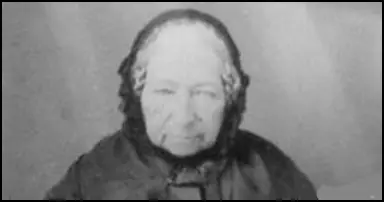
2nd February, 2022: Anne Knight, letter to Matilda Ashurst Biggs (April 1847)
I wish the talented philanthropists in England would come forward in this critical juncture of our nation's affairs and insist on the right of suffrage for all men and women unstained with crime... in order that all may have a voice in the affairs of their country... Never will the nations of the earth be well governed until both sexes, as well as all parties, are fully represented, and have an influence, a voice, and a hand in the enactment and administration of the laws.
Question: Explain why Anne Knight believed that "Never will the nations of the earth be well governed until both sexes, as well as all parties, are fully represented, and have an influence, a voice, and a hand in the enactment and administration of the laws."
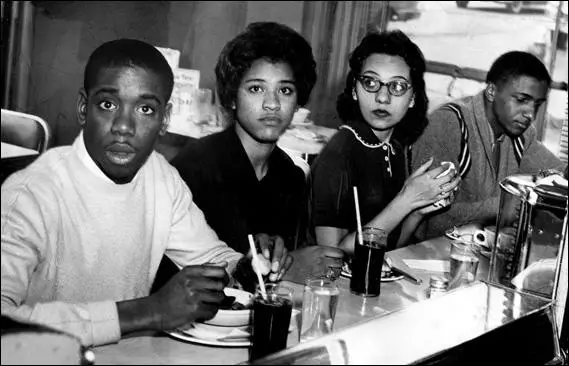
at the Post House Restaurant in Nashville. From left to right: Matthew Walker Jr., Peggy
Alexander, Diane Nash and Stanley Hemphill. (16th May, 1960)
1st February, 2022: Franklin McCain was one of the four black teenagers who took part in the original sit-in in Greensboro Woolworths on 1st February, 1960. He was interviewed by Howell Raines for his book My Soul Is Rested: Movement Days in the Deep South Remembered (1977)
The planning process was on a Sunday night, I remember it quite well. I think it was Joseph McNeil who said, "It's time that we take some action now. We've been getting together, and we've been, up to this point, still like most people we've talked about for the past few weeks or so - that is, people who talk a lot but, in fact, make very little action." After selecting the technique, then we said, "Let's go down and just ask for service." It certainly wasn't titled a "sit-in" or "sit-down" at that time. "Let's just go down to Woolworth's tomorrow and ask for service, and the tactic is going to be simply this: we'll just stay there." We never anticipated being served, certainly, the first day anyway. "We'll stay until we get served." And I think Ezell Blair said, "Well, you know that might be weeks, that might be months, that might be never." And I think it was the consensus of the group, we said, "Well, that's just the chance we'll have to take."
Once getting there we did make purchases of school supplies and took the patience and time to get receipts for our purchases, and Joseph McNeil and myself went over to the counter and asked to be served coffee and doughnuts. As anticipated, the reply was, "I'm sorry, we don't serve you here." And of course we said, "We just beg to disagree with you. We've in fact already been served." The attendant or waitress was a little bit dumbfounded, just didn't know what to say under circumstances like that. And we said, "We wonder why you'd invite us in to serve us at one counter and deny service at another. If this is a private club or private concern, then we believe you ought to sell membership cards." That didn't go over too well, simply because I don't really think she understood what we were talking about, and for the second reason, she had no logical response to a statement like that.
At that point there was a policeman who had walked in off the street, who was pacing the aisle behind us, where we were seated, with his club in his hand, just sort of knocking it in his hand, and just looking mean and red and a little bit upset and a little bit disgusted. And you had the feeling that he didn't know what the hell to do. You had the feeling that this is the first time that this big bad man with the gun and the club has been pushed in a corner, and he's got absolutely no defense, and the thing that's killing him more than anything else - he doesn't know what he can or what he cannot do. He's defenseless. Usually his defense is offense, and we've provoked him, yes, but we haven't provoked him outwardly enough for him to resort to violence. And I think this is just killing him; you can see it all over him.
Question: Members of Congress on Racial Equality (CORE) were mainly pacifists who had been deeply influenced by Henry David Thoreau and the teachings of Mahatma Gandhi and the nonviolent civil disobedience campaign that he used successfully against British rule in India. CORE became convinced that the same methods could be employed by blacks to obtain civil rights in America.
CORE decided to campaign to bring an end to segregated seating in restaurants. In Greensboro, North Carolina, a small group of black students decided to take action themselves. On 1st February, 1960, Franklin McCain, David Richmond, Joseph McNeil and Ezell Blair, started a student sit-in at the restaurant of their local Woolworth's store which had a policy of not serving black people. In the days that followed they were joined by other black students until they occupied all the seats in the restaurant. The students were often physically assaulted, but following the teachings of Martin Luther King they did not hit back.
Explain what Franklin McCain meant when he said: "On the day that I sat at that counter I had the most tremendous feeling of elation and celebration. I felt that in this life nothing else mattered. I felt like one of those wise men who sits cross-legged and cross-armed and has reached a natural high."

